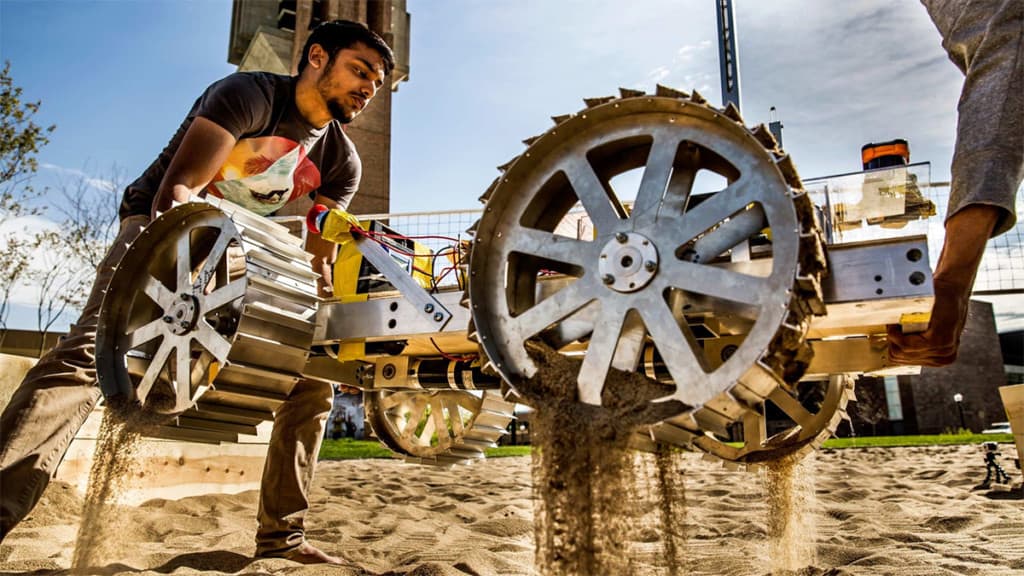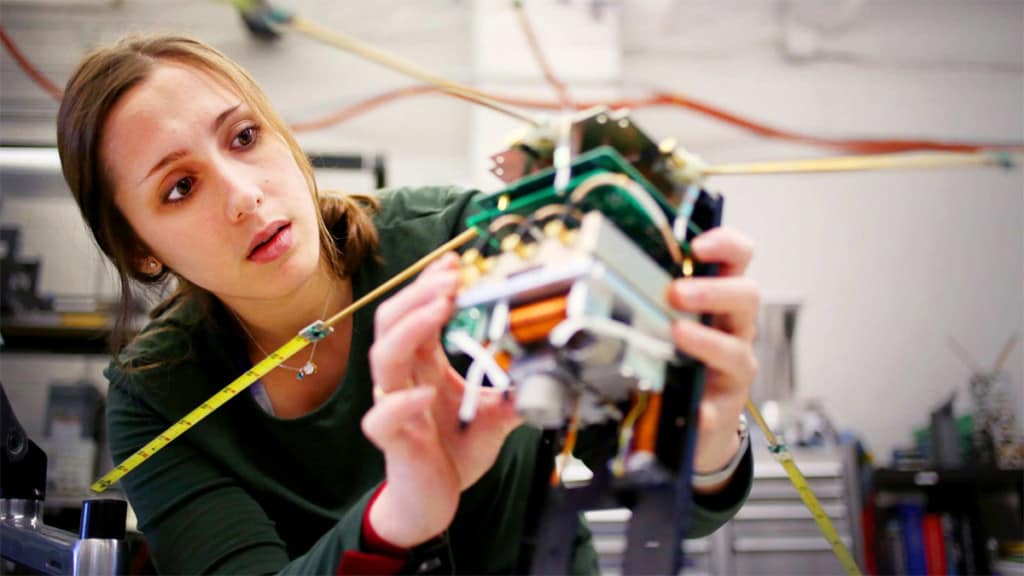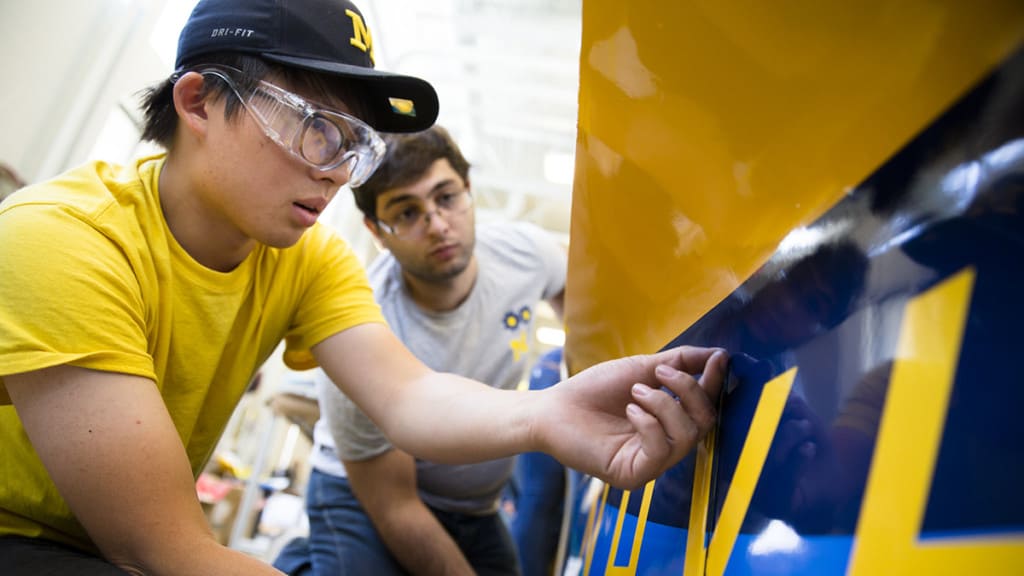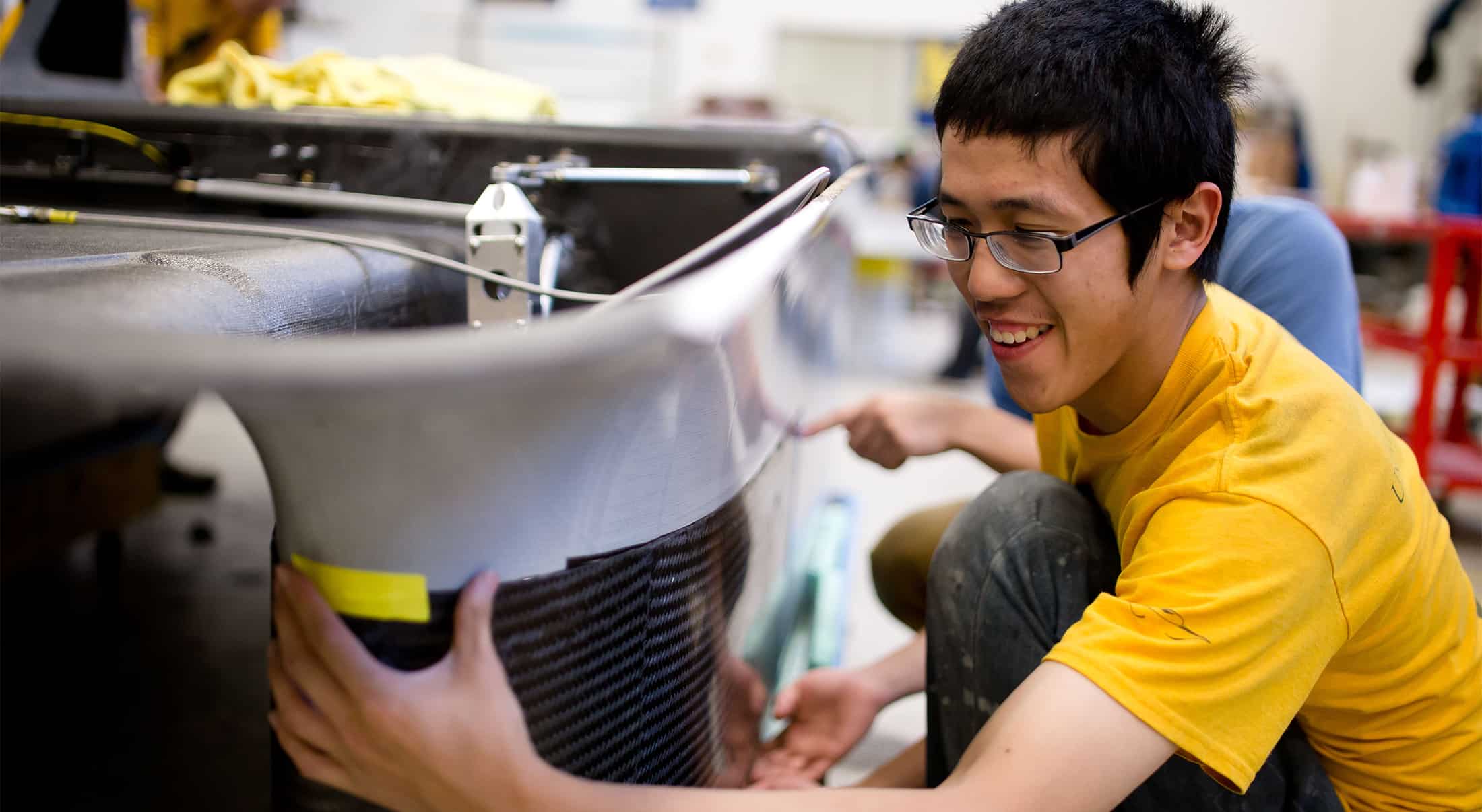
Current Graduate Students
Graduate Student Support
The Academic Services Office (ASO) serves Undergraduate and Graduate students within the Aerospace Engineering department and is located on the second floor of the Francois-Xavier Bagnoud Building (FXB). Our team offers a variety of ways to connect with us throughout the year between events, drop-in advising, and scheduled appointments.
Graduate Advising:
Contact the Graduate Program Advisor (Mirko Gamba, [email protected]) or email [email protected].
We have all the academic basics covered, plus programs to help you succeed and thrive.

Grad Courses
Our graduate programs are highly multidisciplinary. Students enjoy a lot of flexibility and self-direction in choosing their courses, and are welcome to take classes outside of the Department of Aerospace Engineering.

Aero 590 Projects
For MSE students interested in pursuing research opportunities, consider pursuing AEROSP 590. This course can provide research experience for those interested in developing deeper knowledge on a specific subject or planning to apply to PhD programs.

Grad Awards
See award description and stipend amount for each award.
GRADUATE – SUGS FREQUENT ADVISING QUESTIONS
When Should I be applying for SUGS?
Most students will be applying in the Second semester of their Senior year for the January deadline in order to begin in the Fall term. Please note, you will likely be taking graduate level courses in your last semester of undergrad in the hopes that you will be admitted to the program. Once admitted you will officially be a part of Rackham Graduate School.
In the event you are hoping to start SUGS in the Winter term, you will need to be applying in Fall for the October deadline. Again, it is likely you will be taking Graduate level courses with the hopes of being admitted into the program
*Please note, enrolling in graduate level courses does not guarantee your admission to the SUGS program.
What are the requirements for SUGS and the application?
GPA
To be admitted you must have a 3.5 GPA, but if you are interested and close to that requirement we encourage you to apply as well. In the event you do not have a 3.5 GPA when you apply, or are just at that GPA cutoff, the department may not admit you immediately to SUGS. You may get waitlisted – so the offer of admission would be based on your final, cumulative GPA after graduation rather than the GPA you have at the time of application. If you’re waitlisted, you’ll find out whether you’re admitted about 10 days after graduation. Be aware that admission to the SUGS program is becoming more competitive.
Resume
An updated resume will be required. In the event you need help or want someone to review your resume, please contact the Engineering Career Resource Center (ECRC).
Letter of Recommendation
You will need two letters of recommendation. One should be from a STEM Professor and the other should be either an internship supervisor or another faculty member.
Please contact your desired references in advance (at least 6 weeks prior) in order to ensure they are willing and able to provide a positive reference. We recommend you include details about the program you are applying to as well as your updated resume to ensure they can provide a stellar and accurate recommendation.
If they do not respond to your initial inquiry about drafting a letter for you, you can give them between one to three weeks and then contact them again with a gentle reminder. Do not ask more than twice for a letter of recommendation. If you have not received confirmation of their willingness to write a letter of recommendation for you, move on to another potential recommender. Remember that recommenders are very busy, and their lack of response to you does not mean they do not like you. Also, if you do request a letter of recommendation from a different person, please let the people you first requested a letter from know that their time is no longer necessary.
Rackham Admissions Form
When applying to the SUGS program, you will be providing all of the above information to Rackham Graduate School through their Admissions Form. This form will ask you additional questions regarding your qualifications. Please note, you may need to contact your family for some information if you do not know it.
Essays → Sweetland Writing Center
How many credits is the SUGS Degree?
The amount of credits (30) is the same as the Master’s degree. However, it is accelerated in order to complete it in a faster time frame. However, you are not required to stick to this time frame and we will allow up to 5 years to complete the Master’s degree. You will not be able to complete it faster than two semesters though as 18 credits must be taken while officially enrolled in the graduate school.
PROSPECTIVE – MSE FREQUENT ADVISING QUESTIONS
What is the class size?
Class sizes vary greatly; some courses have approximately 20 people in the class, and some are up to 100 people. Directed studies (AEROSP 590) are one-on-one with a faculty member.
In general, 500-level classes will likely have 60-100 people. This will be a mix of master’s degree students and first- or second-year PhD students, and possibly even a few senior undergraduates. Classes at the 600- or 700-level will have much fewer students.
Our department has approximately 400 undergraduates, 200 master’s degree students including SUGS-MSE students, and 120 PhD students.
Is there a thesis requirement?
No, there is no thesis requirement for students in our master’s degree programs (MEng, MSE or SUGS-MSE). Our master’s degrees are considered coursework-based, professional degrees. There is no requirement for either a thesis, research or practicum experience.
Can I do a thesis?
If you would like to complete a thesis you can do so by enrolling in department 590 courses (e.g., AEROSP 590, ROB 590, NERS 590, etc.). This allows you to develop an idea, do independent research, receive mentorship from a faculty member and turn in an academic paper at the end of the semester. You will receive a grade for this work which will impact your GPA. Your finished paper can be used as a thesis.
What do students do during summers?
Master’s students usually complete internships through the USA or abroad although they are not required to do so. There are very, very few graduate-level engineering courses in the summer and no aerospace engineering courses during that time. Other students work onsite in a faculty member’s lab – this can be either at aerospace engineering or in another department – or in other department summer programming on campus.
Is the GRE mandatory?
The GRE is mandatory for all those applying to our regular master’s degree. It is not mandatory for those applying to our SUGS-MSE degree, nor for those applying to our PhD degree.
Is an English language proficiency test required?
An English language proficiency test is required for students whose first language is something other than English. However, if you completed either an undergraduate degree or graduate degree at an institution where the language of instruction was in English and this is formally documented somewhere, such as on a transcript, then you do not need to take an English language proficiency test. Current Michigan students applying to a graduate degree program or dual-degree program are not required to submit further language proficiency test scores during the application process.
Only certain tests are accepted to demonstrate proficiency. You can refer to Rackham to learn what tests are accepted. Duolingo is not an accepted language proficiency test for University of Michigan admissions.
How many credits is required for this degree? In what areas do I need to earn credits to graduate?
MSE and SUGS-MSE students must earn 30 graduate-level credits in order to graduate with the master’s degree. Of those 30 credits, five courses must be completed at the 500-level or higher in aerospace engineering (AEROSP). Courses which are cross-listed with AEROSP will count toward this requirement.
Students must also complete any two pre-approved math courses. You can use a checklist to track your courses and note requirements as you complete them.
Students will need to earn a B or better grade in both the math and 500-level AEROSP courses to count them toward the master’s degree (this means a B- or below will not count toward the five, 500-level classes nor math requirements).
This leaves students with approximately nine credits which they can complete with additional AEROSP courses at the graduate level, graduate courses in other STEM departments, AEROSP 590 directed study opportunities or up to four credits of pre-approved, non-technical courses from CFE, Ross or ELI also at the 500-level or above.
How do grades impact my eligibility for graduation with the MSE or SUGS-MSE degree?
Students must have a cumulative grade point average of ≥ 3.0 to graduate. It is possible to graduate with a C, C+ or B- on a student’s record provided that they earn an overall GPA of ≥ 3.0. These grades will mean that a student passes that class, which means that the class in which they earn one of those grades can still count toward their overall requirement to complete 30 graduate level credits.
However, a grade of C, C+ or B- on an AEROSP 500-level course, or a math requirement course, will mean that the student cannot use that class to fulfill that requirement; they will only count as overall credit toward the degree but the student will need to either repeat the class for a new grade or take a different course in order to earn a B or higher in the required courses.
Does Michigan provide any opportunities to help me improve my English as an international student?
Students can take courses through the English Language Institute either during the summer before they start school or during the academic year.
PhD students who wish to take English language proficiency courses during the summer prior to starting their academic studies at Michigan can discuss this plan with their faculty advisors (also called principal investigators, or PIs). Faculty advisors may be willing to pay for English language summer courses for incoming PhD students at ELI.
I’d like to audit a class – how can I do this?
Every instructor has their own expectations for what auditing will entail; some want students to attend lectures and do homework, some permit auditing students to just attend lectures. Be sure to email the instructor of the class you want to audit to discuss their expectations and get their permission. Then, follow these steps:
- Forward the email from the instructor with permission to audit to the university’s Registrar’s Office at [email protected]
- Copy [email protected]
You must have your student record formally updated to reflect your auditing status and you will still be charged tuition for auditing a class.
Will an audited class count toward my enrollment credits?
No – an audited class will not count toward your enrollment credits. If you are an F-1 student and need to maintain a full-time enrollment status, auditing a class will not count toward your enrollment credit hours.

CULTURE
We know that excellence and diversity go hand-in-hand
We are committed to a department culture that supports and celebrates each of our members in their studies and their work.